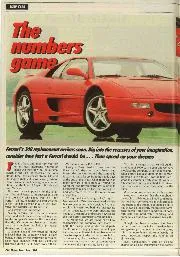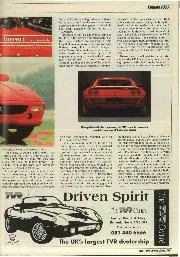

The numbers game
Ferrari's 349 replacement arrives soon. Dig into the recesses of your imagination, consider how fast a Ferrari should be . . . Men speed up your dreams rhis is a…
Police chiefs may advocate raised motorway speed limits. But not the DoT. A new glossy brochure Killing Speed and Saving Lives lists its plans to tackle excess speed. Excess speed, if that implies speed at the wrong time on inadequate roads, can certainly kill and no one should condone it. But the Speed Kills adage, on its own, if adhered to, simply means a slower-and-slower traffic-flow. The cover of this DoT book isn’t encouraging. It has a ’40’ logo which changes to ’20’ as you open it!
The DoT cannot have it both ways. We are told of the serious loss to industry caused by hold-ups after major accidents. A fast traffic-flow is desirable, consistent with safety. We are also told that excessive speed was a contributory factor in 22-32 per cent of accidents investigated by the TRL. So in 68-88 per cent, one deduces, speed was not a factor! Motorways, which carry nearly 15 per cent of our traffic and have a 70mph speed-limit, had just over three per cent of all accidents. Yet this DoT book, ignoring the need for better roads, more off-road parking facilities and a clampdown on joy-riding/racing in stolen cars etc, is devoted to killing speed by heavier fines, more traps and Gatsos, possible speed-limiters on cars, even traffic ‘calming’ by means of humps and narrowing road-areas, the latter being labelled as “road engineering”. The ‘humps-and-bumps’ will get a £42m grant. Expect, too, more confusing 20, 30, 40, 50, 60 and 70 mph restrictions, even 50s on motorways to ease congestion. I ask you!
More public money is to be spent trying to find out why young drivers drive faster than others – could it be that they are not suicidal as is implied but that they happen to possess skill, quick reactions and good eyesight? The young women who commit speeding offences are also to be investigated – could it be that they are anxious to get home before hubby. or need to meet their children and take them home safely? In Scotland the view is as follows: “Drivers are most likely to speed in situations where they perceive that to do so is not dangerous” – yet they too are to be “educated”. The government is committed to cutting speed. If that reduces accidents, we will applaud
But will it?